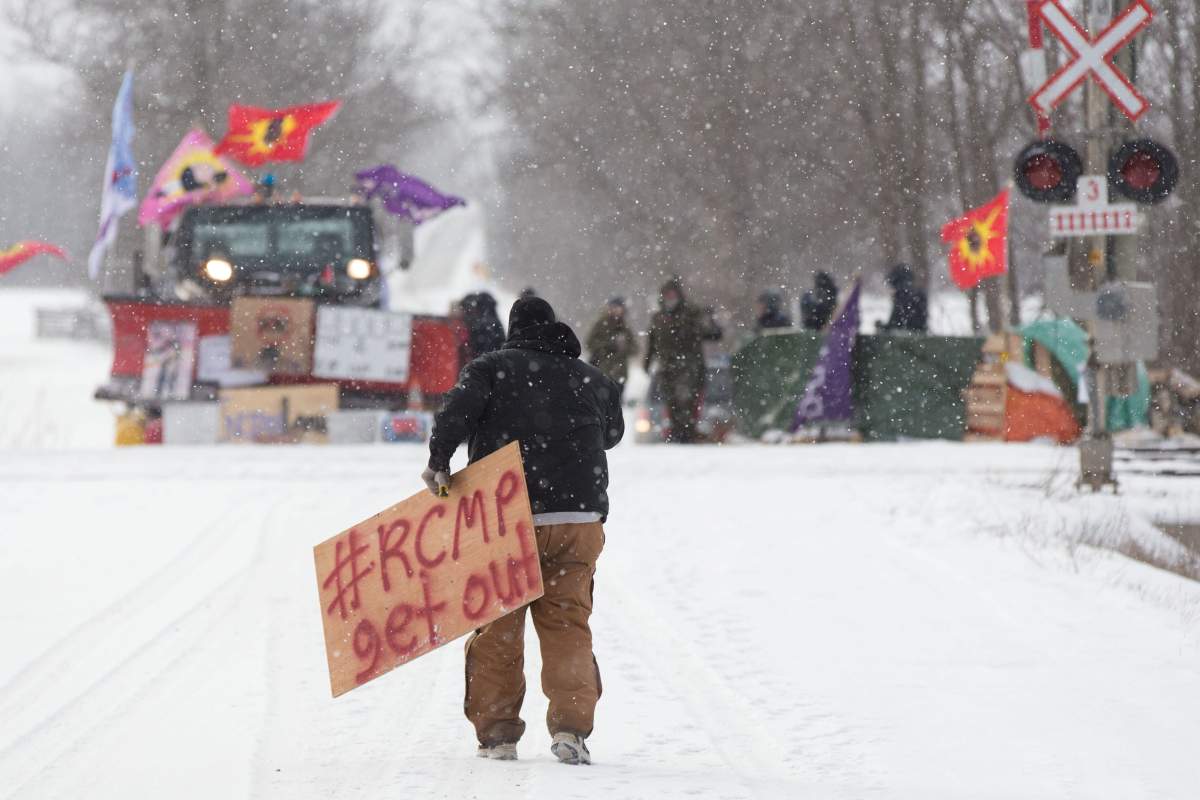The Liberal government has been facing mounting criticism over the solidarity protests taking place over Wet’suwet’en territory in British Columbia, but more recent debate has been centred around police action.

This came to a head on Wedesday, when a hereditary chief representing one of 13 Wet’suwet’en house groups said they won’t meet with Carolyn Bennett and her B.C. counterpart Scott Fraser until an RCMP detachment is removed.
The federal opposition is calling on the government to send in police, but is there anything the government can do?
Conflicting political statements
The demonstrations, which have been ongoing since Dec. 31, are in support of Wet’suwet’en hereditary chiefs who oppose a $6.6-billion Coastal Gaslink pipeline that is set to be built through their unceded territory.
Widespread protests began after the B.C. Supreme Court granted an expanded injunction that established an exclusion zone against protesters interfering with its construction.
While Conservative Leader Andrew Scheer denounced the Canadian government’s response to the blockades as the “weakest response to a national crisis” on Tuesday, Trudeau urged restraint.
“Patience may be in short supply and that makes it more valuable than ever,” Trudeau said.
During an emergency meeting debate at the House of Commons Tuesday evening, Crown-Indigenous Relations Minister Carolyn Bennett also responded to government criticism of the unrest by saying the Government of Canada “cannot direct the RCMP.”
“It is very important to remember that the government does not have the authority to dictate the processes to the RCMP,” said Bennett.

Get daily National news
“It is not the role of parliamentarians to tell the police how to do their job.”
But Public Safety Critic Glen Motz disagreed. He referred to the RCMP Act, which states the minister of public safety has the authority to direct the RCMP, as long as their requests did not interfere with “lawful duties” or have any interference in the “law enforcement function.”

“Given that information, of course the minister of public safety can provide direction to the RCMP,” he said on Wednesday. “The functionality of how they carry out that is up to the RCMP.
“What happens when you have a court injunction? Is law enforcement expected to ignore that?”
Can the government direct the RCMP to make arrests?
The RCMP Act states the minister of public safety has the power to issue directions to the RCMP as long as it abides by three general principles: (1) directions cannot, in effect, require the RCMP to disregard any of its lawful duties; (2) directions cannot infringe on the independence of the RCMP regarding their law enforcement functions; and (3) directions cannot be so broad in nature as to reach beyond federal jurisdiction.

Sara Mainville, a partner at OKT Law, stressed the importance of the independence of the police to keep the authoritative body a peacekeeper, rather than an “arm of the state.”
She said that legally, the RCMP chose to “operationalize the enforcement of ” the court injunction. Requests can be made by the government for the police to stand down, but Mainville said it the decision would ultimately be up to the RCMP.
When asked whether the Canadian government could send police to arrest protesters, Mainville responded with a swift “no.”
“There’s a very fundamental relationship between the solicitor general and the police force but the police force in its operations is independent,” she said.

“The operational decision-making is done solely by the police force.”
She added that the same rule would apply provincially, as well — for example, the B.C. government would not be able to legally direct the RCMP, and neither would Ontario.
Local police forces are also not in federal jurisdiction, including actions taken by the RCMP when they are operating as local police in contract with provinces, municipalities or territories.
In a statement to Global News, the Ministry of Public Safety said the RCMP was independent from the governing body.
“Police independence is crucial to public trust in our institutions. The Minister may not attempt to influence in any way an investigation, or direct the conduct of specific police operations,” they said.
“Our government is committed to protecting the constitutional right to lawful peaceful protest, keeping Canadians safe, and upholding the rule of law.”
The RCMP did not respond to multiple requests for information.



Comments
Want to discuss? Please read our Commenting Policy first.